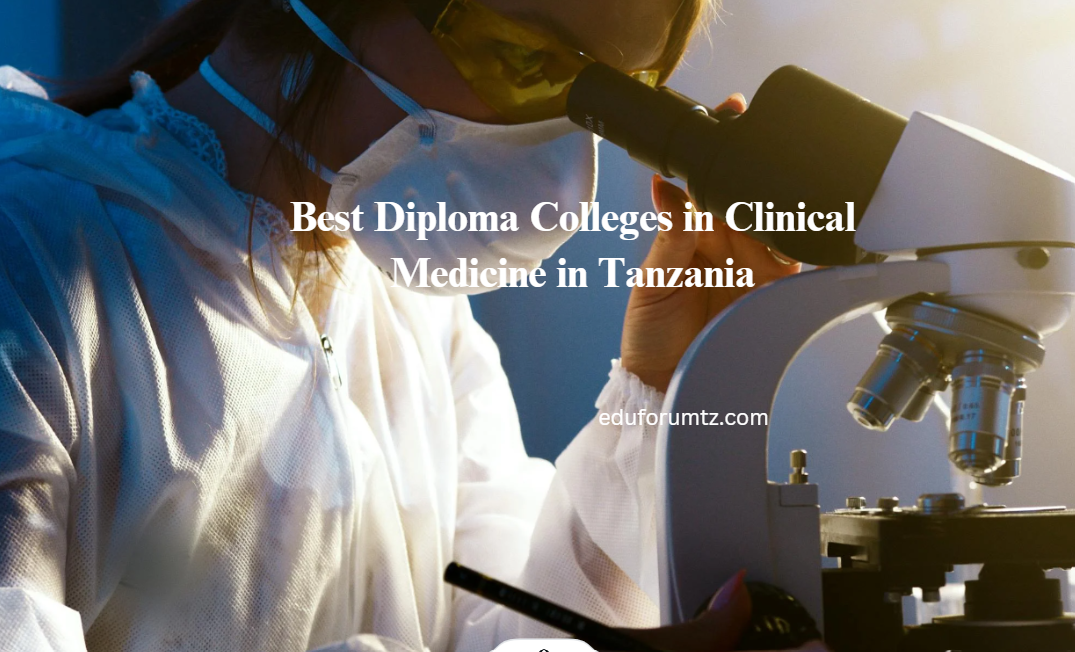
Best Diploma Colleges in Clinical Medicine in Tanzania, vyuo bora kwa kozi za clinical medicine
The demand for skilled healthcare professionals is growing rapidly in Tanzania, making a diploma in Clinical Medicine a valuable path for aspiring medical practitioners. Several top colleges in Tanzania offer excellent programs that equip students with the necessary knowledge and skills to excel in the field of healthcare. With a range of options available, prospective students can find institutions that best match their career goals and educational needs.
These colleges not only provide comprehensive coursework but also emphasize practical training through clinical rotations and hands-on experiences. Students benefit from experienced instructors and modern facilities that enhance the learning process. By choosing a reputable college, students can set a solid foundation for a rewarding career in the medical field.
As the healthcare landscape continues to evolve, enrolling in one of the best diploma colleges in Clinical Medicine can lead to numerous opportunities. From working in hospitals to engaging in community health initiatives, graduates play a crucial role in improving health outcomes across the nation.
Overview of Clinical Medicine Education in Tanzania
Clinical medicine education in Tanzania plays a vital role in preparing healthcare professionals. It focuses on equipping students with practical skills and knowledge essential for serving the community effectively.
Current Landscape of Medical Training
The landscape of medical training in Tanzania has evolved significantly. Various institutions now offer diploma courses in clinical medicine. These programs typically span three years and cover core subjects like anatomy, physiology, and pharmacology.
Many colleges also provide hands-on training through clinical placements. This allows students to interact directly with patients and healthcare teams. Important schools include the School of Clinical Medicine at Muhimbili University and multiple private institutions across the country.
Furthermore, a strong emphasis is placed on addressing local health challenges. Programs often adapt their curriculum to include topics such as tropical diseases. This ensures graduates are prepared for the specific health needs in Tanzania.
Regulatory Bodies and Accreditation
Regulatory bodies oversee clinical medicine education to maintain high standards. The National Council for Technical Education (NACTE) is a key organization that accredits medical training institutions. It ensures that programs meet the necessary educational criteria.
Colleges must also comply with national and international guidelines. This helps maintain a consistent quality of education across the country. NACTE monitors institutions periodically to assess their adherence to standards.
In addition, other health regulatory authorities, like the Medical Council of Tanganyika, play roles in ensuring that medical professionals are competent. Their work helps establish trust in the healthcare system, which is vital for patient outcomes.
Top Diploma Colleges for Clinical Medicine
Selecting the right college for a Diploma in Clinical Medicine in Tanzania is essential. Key factors include academic quality, resources, and reputation among healthcare professionals.
Criteria for Evaluation
When evaluating diploma colleges for Clinical Medicine, several criteria stand out.
- Accreditation: The college must be recognized by Tanzania’s National Council for Technical Education (NACTE). This ensures that the curriculum meets national health standards.
- Curriculum Quality: A well-rounded program covers essential subjects such as anatomy, pharmacology, and clinical practice. Practical training should include rotations in real medical settings.
- Faculty Expertise: Experienced instructors with relevant medical backgrounds enhance the learning experience. Their knowledge can significantly impact student success.
- Facilities: Modern labs, libraries, and clinical simulation centers provide essential resources for students.
- Student Support Services: Counseling, tutoring, and career services can aid students in their academic journey and future employment.
These criteria help ensure students receive a quality education in Clinical Medicine.
Best Diploma Colleges in Clinical Medicine in Tanzania
Here’s a table summarizing the diploma colleges in Clinical Medicine in Tanzania, including their locations and links:
| No | College | Location | Link |
|---|---|---|---|
| 1 | Besha Health Training Institute | Tanga | Besha Health Training Institute |
| 2 | Kolandoto College of Health Sciences | Shinyanga | Kolandoto College |
| 3 | Machame Health Training Institute | Moshi | Machame Health Training Institute |
| 4 | Faraja Health Training Institute | Himo | Faraja Health Training Institute |
| 5 | Kabanga College of Health and Allied Sciences | Kasulu | Kabanga College |
| 6 | DECCA College of Health and Allied Sciences | Dodoma | DECCA College |
| 7 | Musoma Utalii College | Tabora | Musoma Utalii College |
| 8 | Primary Health Care Institute | Iringa | Primary Health Care Institute |
| 9 | RAO Health Training Center | Rorya | RAO Health Training Center |
| 10 | Sengerema Health Training Institute | Sengerema | Sengerema Health Training Institute |
| 11 | St. John College of Health Sciences | Mbeya | St. John College |
| 12 | Victoria Institute of Health and Allied Sciences (VIHAS) | Mwanza | Victoria Institute |
| 13 | Excellent College of Health and Allied Sciences | Dar es Salaam | Excellent College |
| 14 | City College of Health and Allied Sciences | Dar es Salaam | City College |
| 15 | Peramiho Institute of Health and Allied Sciences (PIHAS) | Songea | Peramiho Institute |
| 16 | Top one College of Health and Allied Sciences | Songea | Top one College |
| 17 | International Medical and Technological University | Dar es Salaam | IMTU |
| 18 | Ndolage Institute of Health Sciences | Kagera | Ndolage Institute |
| 19 | Lake Institute of Health and Allied Sciences (LIHAS) | Singida | Lake Institute |
| 20 | Tanzanian Training Centre for International Health | Morogoro | Tanzanian Training Centre |
| 21 | The Suye Health Institute | Arusha | The Suye Health Institute |
| 22 | Eckernforde Tanga University | Tanga | Eckernforde Tanga University |
| 23 | East Evans College of Health and Allied Sciences | Dar es Salaam | East Evans College |
| 24 | Msongola Health Training Institute | Dar es Salaam | Msongola Health Training Institute |
| 25 | Mlimba Institute of Health and Allied Sciences | Ifakara | Mlimba Institute |
| 26 | KAM College of Health Sciences | Dar es Salaam | KAM College |
| 27 | Mgao Health Training Institute | Njombe | Mgao Health Training Institute |
| 28 | St. David College of Health Sciences | Dar es Salaam | St. David College |
| 29 | Mvumi Institute of Health Sciences | Dodoma | Mvumi Institute |
| 30 | Njombe Institute of Health and Allied Sciences | Njombe | Njombe Institute |
| 31 | Mkolani Foundation Health Sciences Training Institute | Mwanza | Mkolani Foundation |
| 32 | Tandabui Institute of Health Sciences and Technology (TIHEST) | Mwanza | Tandabui Institute |
| 33 | Kigoma Training College | Kigoma | Kigoma Training College |
| 34 | Kigamboni City College of Health and Allied Sciences | Dar es Salaam | Kigamboni City College |
| 35 | Elijerry Training Centre | Tanga | Elijerry Training Centre |
| 36 | Chato College of Health Sciences and Technology | Geita | Chato College |
| 37 | St Bakhita Health Training Institute | Namanyere | St Bakhita Health Training Institute |
| 38 | Nkinga Institute of Health Sciences | Tabora | Nkinga Institute |
| 39 | Karatu Health Training Institute | Arusha | Karatu Health Training Institute |
| 40 | Mbalizi Institute of Health Sciences | Mbeya | Mbalizi Institute |
| 41 | Mount Ukombozi Health Sciences Training Centre | Dar es Salaam | Mount Ukombozi Centre |
| 42 | City College of Health and Allied Sciences Ilala Campus | Ilala | City College Ilala Campus |
| 43 | St. Alvin Institute of Health and Allied Sciences (SAIHAS) | Morogoro | St. Alvin Institute |
| 44 | Huruma Health Training Institute | Mkuu | Huruma Health Training Institute |
| 45 | Nyaishozi College Of Health And Allied Science | Dar es Salaam | Nyaishozi College |
| 46 | St. Joseph Health Training College | Mbeya | St. Joseph Health Training College |
| 47 | Ilembula Institute of Health and Allied Sciences | Ilembula | Ilembula Institute |
| 48 | Kisare College of Health Sciences | Musoma | Kisare College |
| 49 | Kilimanjaro College of Health and Allied Sciences | Kilimanjaro | Kilimanjaro College |
| 50 | Tabora Institute | Tabora | Tabora Institute |
Career Prospects for Graduates
Graduates with a diploma in Clinical Medicine have varied and rewarding career opportunities. They can work in several sectors, including:
- Government Health Agencies: Many graduates find positions in public health departments.
- Non-Governmental Organizations (NGOs): NGOs often seek trained personnel for healthcare projects.
- Faith-Based Institutions: These organizations provide community health services and need skilled staff.
- Private Corporations: Healthcare companies also hire graduates for various roles.
The demand for qualified healthcare professionals is high. Graduates can work as Assistant Medical Officers (AMOs), providing essential medical care to communities. This role is vital in areas with limited access to healthcare services.
Additionally, graduates may pursue further studies. Higher diplomas can increase their skills and job prospects. Specialized training prepares them for leadership roles in health care.
Career growth is possible through experience and additional education. Continuous professional development can lead to positions such as health program managers or clinical instructors.
In summary, the career outlook for graduates in Clinical Medicine is bright. They play a crucial role in improving community health and can build a successful career in various settings.
Final Thoughts
Choosing the right college for a diploma in Clinical Medicine in Tanzania is crucial for aspiring healthcare professionals. Various institutions offer programs that meet national standards and provide valuable training.
Key factors to consider include:
- Accreditation: Ensure the college is recognized by NACTE.
- Curriculum: Look for comprehensive programs that cover essential medical topics.
- Practical Experience: Important for hands-on learning through clinical rotations.
- Support Services: Good colleges offer academic and career support to students.
Students should research thoroughly to determine which college aligns best with their career goals. Prioritizing quality education will lead to better opportunities in the healthcare sector.
Also Read;
- Top Universities For Chemical Engineering in Tanzania
- Top Universities For Telecommunications in Tanzania: best Institutions
- Top Meteorology and Atmospheric Science Universities in Tanzania: High ranking
- Top Universities For Environmental Science in Tanzania: Top Institutions
- Top Universities For Liberal Arts and Social Sciences in Tanzania
- Top Ranking Universities in India
- Top Universities For Environmental Science in Tanzania

